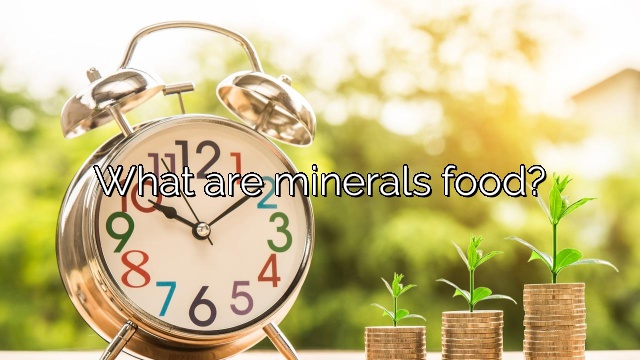Minerals are those elements on the earth and in foods that our bodies need to develop and function normally. Those essential for health include calcium, phosphorus, potassium, sodium, chloride, magnesium, iron, zinc, iodine, chromium, copper, fluoride, molybdenum, manganese, and selenium.
In geology and mineralogy, a mineral or mineral species is, broadly speaking, a solid chemical compound with a fairly well-defined chemical composition and a specific crystal structure that occurs naturally in pure form.
The geological definition of mineral normally excludes compounds that occur only in living beings. Wikipedia
A mineral has 5 characteristics, naturally occurring, solid, inorganic, crystalline structure, and the same chemical composition throughout So repeat after me A mineral is Naturally occurring-naturally occurring Inorganic solid-inorganic solid Crystalline structure The same chemical composition throughout.
Most minerals can be characterized and classified by their unique physical properties: hardness, luster, color, streak, specific gravity, cleavage, fracture, and tenacity.
Make Li-Ion batteries.
Produce commercial electric vehicles.
Create underwater subsea electrification.
Power telecommunication devices.
The density of a mineral is the ratio of its mass to its volume. It is a measure of how much “stuff” is squeezed into the amount of space the mineral occupies. Objective: Students will measure and compare the densities of minerals.
Biden Fires Warning Shot for Retirees ... Are You at Risk?
What are the 7 types minerals
They take into account calcium, phosphorus, magnesium, sodium, potassium and sulfur chloride.
What are 13 essential minerals
Health requires several minerals: calcium, phosphorus, potassium, sodium, chloride, magnesium, zinc, iron, iodine, sulfur, cobalt, copper, fluorine, manganese, and selenium.
What are minerals food
Meat.
Corn.
Fish.
milk combined with dairy products.
Fruits and vegetables.
Nuts.
Do THIS Or Pledge Your Retirement To The Democrats
What are the 10 most important minerals
These include potassium, sodium, chloride, calcium, phosphorus, magnesium, and sulfur supplements. These important minerals can be found in a variety of foods.
What are minerals How are minerals important to us Class 7
Minerals are natural substances that have certain physical properties and a certain chemical composition. Minerals are extremely useful for humanity. Some mineral deposits such as coal, natural gas and oil are used as fuel. They are also commonly used in industry.
What are minerals What is the difference between organic and in organic minerals
Organic minerals – they come to life or are alive and can give life to cells. They contain carbon and its electrons that rotate clockwise, just like in any human body. … Inorganic materials – many of which have never been alive, are carbon-free and therefore cannot animate cells. The body processes metals like these toxins.
What are ferrous minerals How are they different from non-ferrous minerals
The quick answer is that ferrous metals are made up of iron, while non-ferrous metals are made up of lesser amounts. The longer answer is that ferrous and non-ferrous metals have their own unusual properties.
Is the chemical reaction wherein rock forming minerals react with water and form different kinds of clay minerals
Chemical weathering is caused by the reaction of rainwater with grains of vitamins in rocks to form better minerals and soluble (clay) salts. These reactions occur especially when this type of water is slightly acidic.
ALERT: Secret IRS Loophole May Change Your Life


